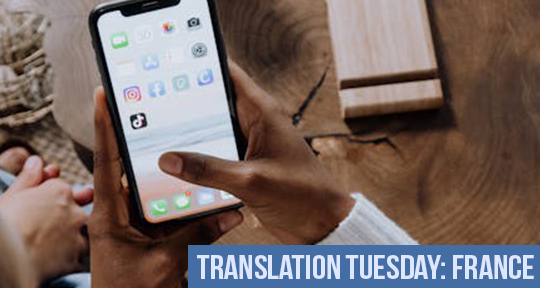For this week’s Translation Tuesday, we bring you an excerpt from “Alone,” Nesrine Slaoui‘s intricate portrait of immigrant life in modern France, translated by Frances Egan. In these three spare, plainspoken vignettes, the lives of two women intertwine: Anissa, the child of two Moroccan immigrants in the Argenteuil banlieue, and Nora, a Maghrebi businesswoman in Clichy. Despite their various attempts to assert control over their own lives—despite Anissa’s attempt to bond with a new classmate, despite Nora’s attempts to stand up for herself and advocate for change in her workplace—their actions are continually circumscribed by greater social forces, by the historical inertia manifest in the petty cruelty and unexamined prejudice of their classmates and colleagues. What follows is a forceful examination of racism and economic inequality in modern France—and a challenging reminder that none of us is as free as we would like to believe.
3 September 2021
Cité Champagne, Argenteuil
In Marseille’s Quartiers Nord, Bricarde and Castellane, the drug dealing hotspots where a kid dies every fortnight from a Kalashnikov bullet, the windows offer a dreamy and unobstructed view of the Mediterranean Sea. A tease, an enviable and deceptive skyline, since the only place you can actually access the beach is from one small spot at L’Estaque. Here, in the much quieter cité Champagne, about twenty kilometres northwest of Paris, the balconies of the social housing block offer a panoramic view of the capital and its monuments, the Eiffel tower, sparkling at night, in prime position. The day they moved in, Karim kept this view until last, as a surprise for his wife Yamina. They had both been amazed that such luxury could penetrate this isolated spot. It made you wonder if the town planners and architects of these housing estates were trying to maximise the contrast between here and there, or if they wanted to soften the dreary dereliction of this Argenteuil ghetto. Perhaps they imagined the residents gazing into the distance and forgetting the reality at their feet: the broken lifts, the lobbies smelling of urine.
On the ninth floor of her tower, Anissa wasn’t thinking much about the skyline. Locked away in her room, she was trying to take a photo of herself on her phone. But even standing on her tiptoes, so that her legs looked longer, and arching her back, to emphasise her bum, she didn’t have one shot she could post on Instagram. And that’s despite knowing every tip there was to enhance your figure: stand slightly side-on, tuck your tummy with a hand to your waist. Expression wise, she made sure not to smile and kept her mouth slightly open to hold her delicate features in place. All those hours spent scrolling social media, day after day, meant she followed the rules without even realising it. But it didn’t matter. The reflection in the rectangle mirror in her bedroom wouldn’t do what she told it to, and she couldn’t make her body match the profiles that flitted across the screen. Without filters, without tricks, her body and her face were ordinary; her imperfections, her asymmetries were there for everyone to see. None of it looked like the calibrated social media ideal, like the apparitions, the fantasies. She couldn’t compete, she couldn’t fight. And she was tormented by the gap between what she wanted to look like and her modest and underwhelming reality. The only thing she liked was her flat teenage stomach. Everything else was too small, too skinny, not woman enough.

